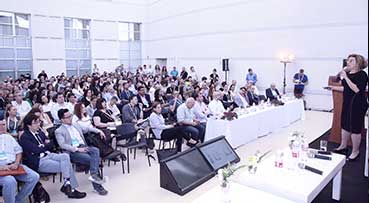What happens when the competitive advantage, which relied in the past decades on the minds of the employees in the workplace, shifts to depend on their hearts? We’ll get to that towards the end of this post.
Humans are still the main resource in most organization. It is true today and will probably remain so in the next few years. Even as we talk about Robots and Algorithms replacing what human workers do today, we cannot forget that people build robots, design algorithms, use them, and create whole worlds around them.
The changes in the environment, the technologies, the markets, put a lot of pressure on what we once considered stable processes in the organization. This makes employee engagement more important than ever before. An organization that does not ensure its employees are well connected to its objectives might discover, as things shift, that its employees are simply doing more of what they are used to doing. Whereas engaged employees will use of the shifting environment to create new ways of collaboration and discover creative approaches to move themselves and the organization to fulfill their purpose.
According to Gallup only 13% of employees worldwide are engaged at work or, in other words, care about the strategy, their organization, business results. 13%! And the rest? They define themselves as not engaged or even actively disengaged… In the US alone, the percentage of engaged employees is around 30% for a number of years now. This figure is also similar for the engagement level of managers in the organization, only 35% of whom define themselves as engaged. So it is not surprising that about 70% of the reasons causing employees not to be engaged are attributed to managers.
For those of us who are managers this is a significant red flag. If your employees are engaged, they are involved, enthusiastic, committed to the workplace and the objectives. But the figures above tell a story of employees who are indifferent, passing the time in the workplace without commitment to their own performance or that of the organization. If this is true in your organization, there is a real danger to your ability to deliver, let alone grow and innovate.
You might be familiar with the saying: “people join organizations but they leave managers”. So why is it that so many managers can’t seem to create a work environment for their teams, one that will generate motivation, engagement and mutual commitment?
At least part of the answer resides with the changes happening to the roles of managers and employees in the new world of work. Let’s take a look at how these roles evolved. When the Industrial Era replaced Era of Agriculture, people left the farms to move to the cities and work in factories. These workers were there for their physical labor and the managers were needed to supervise, direct and run the work. As we transitioned to the Information Economy, the workers moved from the factories into office buildings and instead of engaging their physical labor industry began engaging their minds. That required a new shift for managers, who now ran work processes but let their employees have more of a say in defining how they went about getting the work done. This is the manager-employee relationship we are used to today.
In a fascinating article in HBR titled From the Knowledge Economy to the Human Economy we can begin exploring the next era of work, the move from the Information Economy to the Human Economy, where the whole person, not just the hands or the mind, is at the center. What does that mean?
The smart machines sprouting around us might be able to replace the human mind in a growing number of tasks and roles. But people have skills and capabilities that cannot be designed into algorithms – creativity, engagement, collaboration, character, caring – in other words, our humanity. Think about it, what happens when the competitive advantage, which relied in the past decades on the minds of the employees in the workplace, shifts to depend on their hearts?
And so we return to the role of the manager in engaging employees. In this new, human era, the essence of engagement expands from a conversation about corporate strategy and challenges to a conversation about purpose, the “why”, the “for what”, of meaning and consequences. And since the flow of conversation now travels through networks and less through hierarchy, the role of management changes from being the gateway between employees and senior management to becoming mentors for their employees and facilitators of these conversations. If we once expected our managers to have all the answers, today we expect them to be able to ask questions. And tomorrow, we will expect them to have the humility to enable their employees to know more than they do, to allow them to ask and answer. These managers will reflect the values of the organization and allow their people to be the change they want to see.
One of the most interesting dimensions of the transition in the role of managers is that vulnerability. There is a lot of power in knowing your own limitations, the limitations of your authority, of your knowledge, of your capabilities. Recognizing these limitations allows us to be more open as managers, to accept the knowledge and capabilities offered by those around us and understand that with them we are stronger than we are on our own. To move forward in this world we all have to step out of our comfort zones and understand that in today’s complex environment you cannot walk alone, you can no longer rely only on your own experience and knowledge, great as they may be. This requires that we open ourselves up, admit to not knowing, allow ourselves to be vulnerable. And in doing this, we are free to innovate and experiment because the worst thing that can happen is that we fail and failure, as we all know, is a necessary step towards learning and onwards to success.
There is no place in the organization today for managers who operate from authority and control, something along the lines of “do this because I said so”. And there is also no place for managers who operate from their own personal excellence or “do this like I do, I’m here because I know best”. These attitudes do not allow teams to bring themselves to the table and do not allow employees to grow as individuals and to feel valued and impactful.
So if you are managers, now is the time to test yourself and ensure that you are managers ready for the human economy. And if you are considering changing a job, choose a manager. Even if you have a portfolio career, do yourself a favor and find yourself a mythological manager.
Some of us were fortunate to have had a mythological manager. Eli Ramon was my mythological manager. He gave me my first break, then the second and the third. He was always next to me when I needed a shoulder, behind me when I needed support, in front of me when I needed a reflection. He helped me through the hard times and encouraged and cheered me on when everything fell into place. And he never, never ceased to be my manager, the one I went to for advice and consultation, long after he was no longer my manager in any HR system.
Don’t give up on finding your mythological manager. And then go on to become a mythological manager for someone else.

![large-AX1A2125-2[1]](https://niritcohen.com/wp-content/uploads/elementor/thumbs/large-AX1A2125-21-pnzedcs72atx5aeurqytqdiihxixlq02re9mlz805s.jpg)






